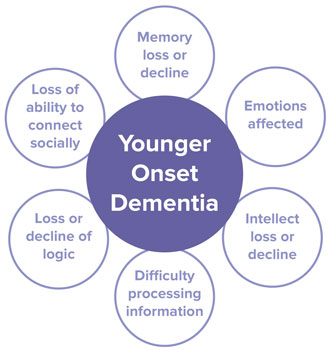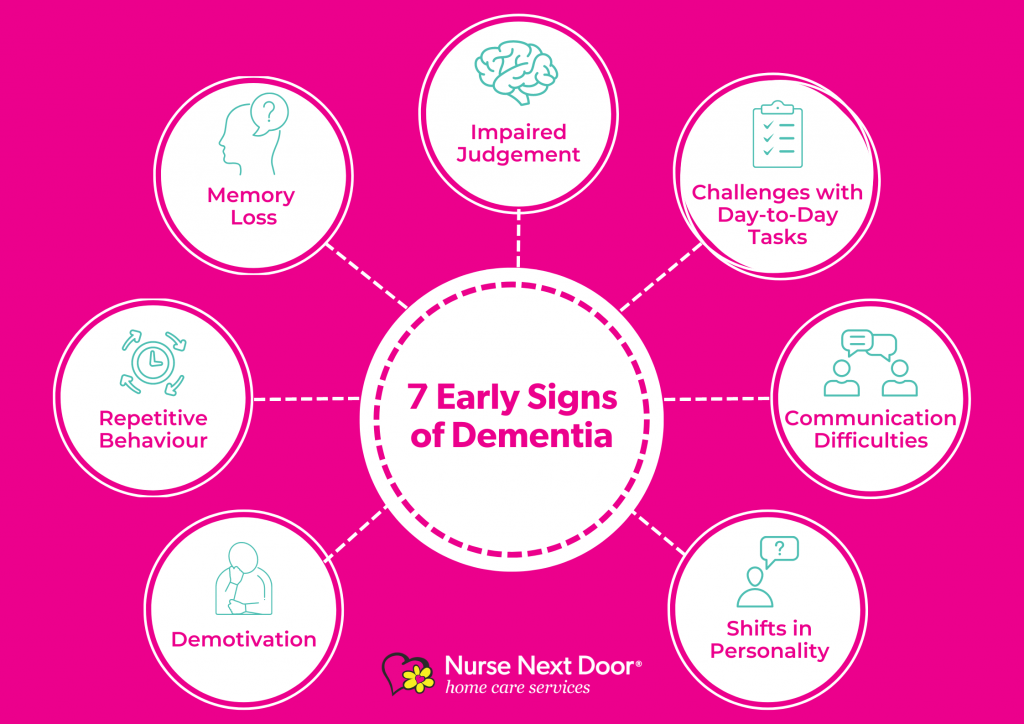Coping Strategies for Families Facing Frontotemporal Dementia
Comprehending the Effect of Dementia on Daily Life and Caregiving
Mental deterioration impacts day-to-day life in extensive ways, influencing not simply those diagnosed but additionally their caregivers. As cognitive decrease progresses, you could discover adjustments in interaction and routine that difficulty both celebrations.
The Stages of Mental Deterioration and Their Results on Life
As you browse the journey of dementia, comprehending its stages can substantially impact how you manage daily life. Dementia commonly proceeds with 3 major stages: early, middle, and late. In the beginning, you might discover occasional memory lapses or problem locating the right words. This can result in irritation, however recognizing these indications early helps you adapt your regular and look for support.
During the center stage, you'll experience extra recognizable cognitive decrease. Daily jobs may come to be difficult, and maintaining your self-reliance might need modifications. Making use of reminders and simplifying your environment can aid.
In the late phase, people often need significant support with daily tasks. Planning for care ends up being crucial, focusing on convenience and high quality of life. By understanding these phases, you're far better furnished to react proactively, ensuring you or your liked one can navigate the obstacles with self-respect and grace.

Adjustments in Interaction and Social Communication
Just how do adjustments in interaction affect your daily interactions as mental deterioration progresses? As dementia developments, you could observe that simple discussions end up being challenging. Words may escape you, or you might battle to locate the best phrases. This can lead to stress for both you and your enjoyed ones. Nonverbal hints, like motions or face expressions, end up being increasingly important.
You might locate it easier to attach via these means rather than relying solely on talked language. Paying attention abilities can likewise alter; you might discover it more difficult to bear in mind or follow conversations what was simply said (Early Onset Dementia). This can lead to misunderstandings or sensations of isolation
Encouraging perseverance and creating an encouraging environment can aid. Taking part in tasks that cultivate connection, like songs or art, can boost social communications. Keep in mind, preserving connections is still possible; it's simply about adjusting to brand-new means of communicating.
Effect on Daily Routines and Activities
While navigating day-to-day routines, you'll likely discover that tasks you as soon as completed easily become a lot more tough as dementia advances. Easy tasks like food preparation, dressing, or even showering might need more time and effort. You may locate yourself forgetting actions in familiar regimens or battling to remember where you positioned items. This can result in disappointment not just for you, but also for those around you.
Adapting your environment can help; for instance, classifying products or using lists can simplify tasks. Involving in recurring, structured activities can likewise offer convenience and a feeling of success. Keep in mind, it's all right to ask for help.
Emotional and Behavior Obstacles
Guiding through day-to-day regimens can bring around not just useful challenges, however also psychological and behavior ones. You may notice adjustments in state of mind, such as increased stress and anxiety or disappointment, which can stem from confusion or trouble in completing tasks. As you browse these minutes, it is essential to identify that your liked one may reveal their feelings via actions like anxiety or withdrawal.
These emotional reactions can be uncertain and may develop without caution, leaving you both feeling bewildered. You may discover that acquainted settings or regimens can help in reducing stress and anxiety, but keeping perseverance comes to be significant. It is very important to verify their sensations, also if you don't fully comprehend them.
The Role of Caregivers in Sustaining People With Dementia
As a caretaker, you play a vital role in supplying emotional support for individuals with dementia. Developing everyday care routines can develop a sense of security and comfort, assisting to reduce their anxiousness. By recognizing their needs and making use of efficient methods, you can significantly enhance their lifestyle.
Psychological Support Approaches
When taking care of someone with dementia, comprehending the emotional landscape is necessary for supplying effective assistance. You'll commonly locate that patience and compassion go a long way. Validate YOURURL.com their feelings; if they express confusion or disappointment, recognize it without dismissing their emotions. Straightforward motions, like holding their hand or maintaining eye contact, can develop a sense of safety. Attempt to take part in tasks that they enjoy, as this can spark delight and connection. Keep in mind to interact plainly and slowly, using a calm tone. Encourage expression via songs or art, which can act as a powerful electrical outlet. Eventually, do not fail to remember to deal with your own emotional requirements; looking for support for on your browse around this web-site own can improve your capability to take care of them.
Daily Treatment Routines
Developing everyday care regimens is necessary for providing security and comfort to people with mental deterioration, as these regimens can help in reducing complication and anxiousness. You can begin by laying out a consistent routine for dishes, tasks, and rest. This predictability aids your enjoyed one feel more safe and secure and engaged.
Include familiar jobs, like folding laundry or watering plants, which can stimulate favorable memories and promote a feeling of success. Usage visual signs, such as schedules or lists, to direct them with the day.
Be flexible, though; adapt routines as required based on their mood or energy degrees. Vascular Dementia. Bear in mind, your perseverance and understanding are crucial in steering their changing requirements, ensuring they really feel supported and valued throughout their life
Developing a Safe and Comfortable Living Atmosphere
Producing a safe and comfortable living environment is necessary for individuals with dementia. You'll intend to make home safety adjustments that minimize threats and ensure familiarity to offer a feeling of convenience. By focusing on these aspects, you can help create an area that sustains both safety and security and well-being.
Home Security Adjustments
As you browse the difficulties of mental deterioration, making home security modifications can greatly improve convenience and security. Start by getting rid of tripping threats like carpets and mess, guaranteeing pathways are clear. Set up grab bars in shower rooms and non-slip floor coverings in the shower to avoid drops. Take into consideration using brighter lights and evening lights to improve presence, especially throughout nighttime. Label essential locations, such as the restroom and kitchen area, with clear indicators to assist with positioning. Protect any type of sharp items or harmful substances unreachable. Furthermore, analyze your home's locks and alarm systems to validate they're easy to use and offer comfort. These modifications not only promote security but likewise urge independence, enabling your liked one to feel more at convenience in their environment.
Comfort and Familiarity
After guaranteeing a safe setting with needed alterations, cultivating comfort and familiarity is necessary for people with dementia. Keep a constant routine to aid them really feel grounded and minimize stress and anxiety. Involving in familiar activities, such as paying attention to music or gardening, can enhance their sense of belonging, making their living setting a real refuge.
Approaches for Reliable Caregiving and Assistance
While navigating the obstacles of dementia care can really feel frustrating, executing reliable approaches can significantly boost both the caregiver's and the client's everyday experience. Start by establishing a routine; predictability helps in reducing over here anxiety for both you and your liked one. Use clear, simple communication-- direct concerns and short sentences can avoid confusion.

Don't fail to remember to deal with yourself; routine breaks and get in touch with support system. Sharing experiences with others in similar scenarios can give valuable understandings and psychological relief.
Last but not least, remain patient and versatile. Dementia can bring unpredictable changes, so adapting your strategy is necessary. By using these strategies, you can foster an extra favorable atmosphere that benefits both you and your liked one.
Frequently Asked Concerns

What Are the Different Kinds Of Dementia?
You'll find a number of kinds of mental deterioration, including Alzheimer's, vascular mental deterioration, Lewy body mental deterioration, and frontotemporal mental deterioration. Each type impacts memory and cognitive feature in a different way, so comprehending the distinctions is necessary for appropriate diagnosis and care.
Exactly How Can I Aid Somebody With Early-Stage Mental Deterioration?
You can help a person with early-stage dementia by holding your horses, providing support, and encouraging them to engage in tasks they enjoy. Keeping regimens regular and preserving open interaction can additionally make a considerable difference in their life.
Are There Financial Resources Available for Mental Deterioration Care?
Yes, there are financial sources readily available for mental deterioration treatment. You can check out government help programs, not-for-profit organizations, and insurance policy choices. It's likewise smart to get in touch with regional companies for certain sources tailored to your circumstance.
What Legal Factors To Consider Should Caregivers Be Conscious Of?
As a caregiver, you should take into consideration power of attorney, healthcare proxies, and guardianship laws. It's vital to understand the lawful civil liberties and responsibilities you hold, ensuring your liked one gets proper care and security.
How Can I Deal With Caretaker Stress?
You can deal with caregiver stress by focusing on self-care, looking for assistance from friends or teams, establishing realistic expectations, taking breaks, and practicing relaxation techniques. Bear in mind, your well-being matters just as high as the person you're looking after.
Understanding the Impact of Dementia on Daily Life and Caregiving.
As you navigate the trip of dementia, recognizing its phases can markedly influence just how you handle everyday life.While navigating daily regimens, you'll likely see that jobs you once finished effortlessly become much more challenging as dementia proceeds.Developing everyday care regimens is essential for providing stability and comfort to people with dementia, as these regimens can assist reduce confusion and anxiousness.While steering the difficulties of dementia care can feel overwhelming, applying reliable methods can significantly enhance both the caregiver's and the client's everyday experience.